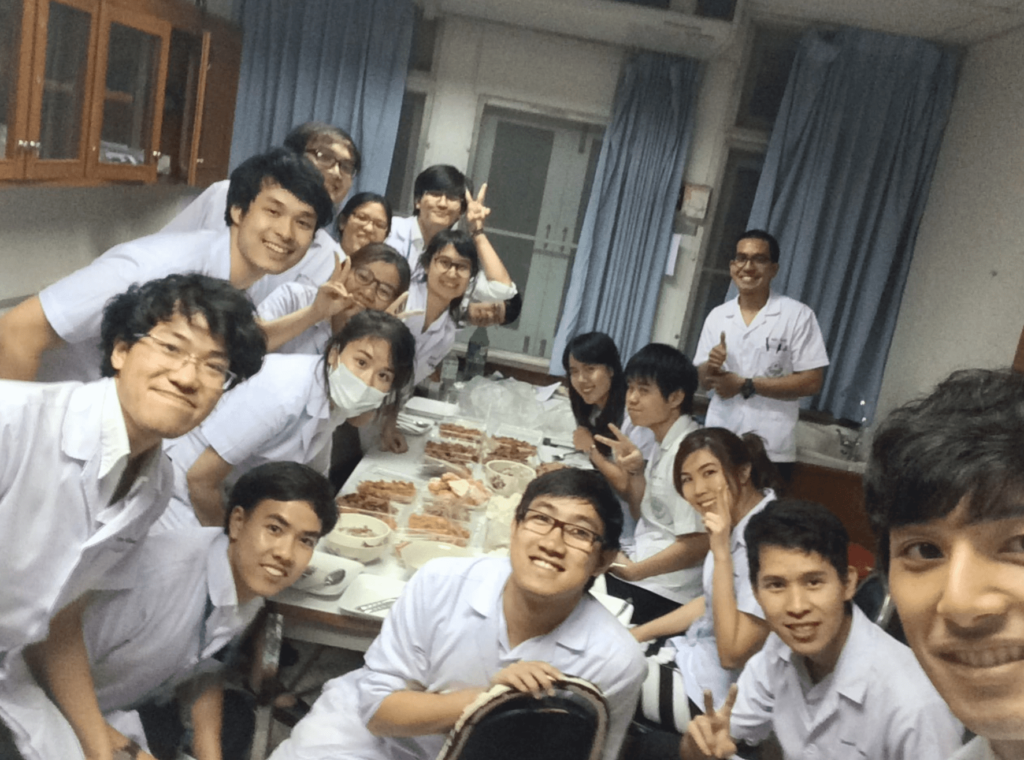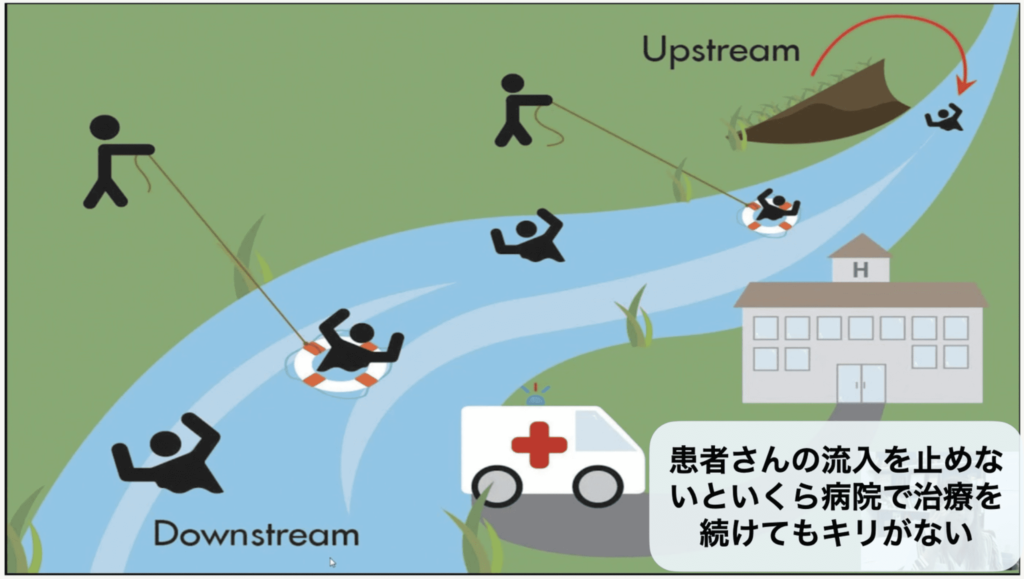Introduction
My name is Yūki Okada, and I founded Setolabo in 2018 while I was still a medical student at Kagawa University; the company was formally registered in 2019. With nothing but a burning desire to solve pressing social issues—and a mere ¥50,000 in start-up capital saved from part-time work—I set out into the unknown. Thanks to the support of many friends, mentors, and partners, what began as a one-person effort has grown into a thriving company with a robust team and strong revenues. Though metrics like headcount and sales alone cannot define our value, I believe our success reflects the trust and encouragement of everyone who has helped along the way. Going forward, I see it as my mission to repay that kindness by giving back to society.
From Harsh Medical Reality in Thailand to Setolabo’s Origin
During my fourth through sixth years of medical school, I was awarded the MEXT “Tobitate! Study Abroad Japan” scholarship, which allowed me to spend a total of six months studying in Thailand. There, medical students are invited to participate actively in clinical care, learning firsthand alongside practicing physicians. While Thailand offers universal healthcare access in urban centers, my rotations in provincial hospitals were both eye-opening and sobering—revealing gaps in resources and care that inspired me to dedicate my career to preventive medicine and early detection.

Healthcare was being provided in appalling sanitary conditions—windows left wide open so pigeons could fly through the wards, and beds lined up all the way out into the outdoor corridors. Repeated outbreaks of drug-resistant bacteria led to numerous in-hospital infections, and many patients died as a result. In the emergency department, an ambulance arrived every five minutes, and patients even walked in on foot, creating a relentless stream of critically ill people. After discharge, patients suffering from the exact same illnesses were readmitted one after another, perpetuating an endless cycle of makeshift treatment. With such an overwhelming caseload, doctors had virtually no days off, became disheartened and exhausted, and many ultimately left public hospitals for private hospitals or cosmetic clinics.

source: www.phsd.ca
Continuing to treat patients won’t solve the problem: as long as new cases keep emerging, hospitals can never catch up unless we curb the inflow through prevention. In Japan, health screenings are widely promoted and reliable medical information is easily accessible online—but Thailand still lacks those preventive systems.
Through my experience in Thailand’s harsh clinical setting, I saw firsthand how the absence of regular check-ups and low medical literacy—symptoms of underdeveloped preventive care—meant lives were lost that could have been saved. I realized that Japan, too, urgently needs stronger preventive medicine, and I became determined to give back to my community by advancing early detection and prevention.
Setolabo’s Humble Beginnings: ¥50,000 in Capital and a Wooden Apartment
I entered medical school with no background in business—and frankly, no interest, since I associated “business” with simply making money. As a result, I never studied it. Although I yearned to “serve my community through preventive medicine,” I wondered how to tackle social issues sustainably. It became clear that any lasting solution would require a viable revenue model—monetization was essential. Before I knew it, my passion had taken the form of a business.
When I began my residency, moonlighting was prohibited, so I consulted Japan’s Ministry of Health, Labour and Welfare. They advised that I could incorporate a company as long as I took no salary. With that green light, I whimsically registered Setolabo—capitalized at just ¥50,000—in a single room of my wooden apartment.
People often judge by appearances, and as Setolabo grew, I was urged to increase our capital to bolster credibility. Yet I have never changed that original ¥50,000. It embodies our founding spirit: we are not here merely to chase profit, but to address social problems in a sustainable way. Our business exists not for its own sake, but as the natural outcome of our mission-driven work.
Creating a Healthy, Smiling Society through Preventive Medicine
Under our philosophy of “creating a healthy, smiling society through preventive medicine,” Setolabo focuses on two key priorities: making preventive screenings readily accessible for early disease detection, and supplying accurate medical information in an era of information overload.
1. Effort to Detect Disease Early
Our first business brings preventive testing closer to people’s lives so that illnesses can be caught sooner. We have established testing centers in Kagawa and Osaka Prefectures—recently reclassified as a research institute in Kagawa—offering services for cancer, infectious disease, and genetic testing.
To popularize tumor-marker screening, we partner with various medical institutions. However, because some cancers still escape early detection by markers alone, we are creating an ultra–early detection system that works from just a single drop of blood. By enabling home-based testing, we aim to make cancer screening as routine as checking blood pressure—and to build a society where no one dies of undiagnosed cancer. Specifically, we are preparing clinical trials in collaboration with university hospitals to detect tiny fragments of tumor DNA circulating in the bloodstream. Once these trials complete, we will roll out this testing method across Japan—and eventually bring it to medically underserved countries—to advance global cancer prevention.
Beginning in 2023, we also entered the cancer–treatment diagnostics field with a Cancer Gene Panel service. By analyzing the genetic mutations in a patient’s tumor, this test reveals the tumor’s unique characteristics and guides personalized therapy—an essential step for cutting-edge treatments. Today, only around 100 facilities in Japan, including university hospitals, offer these panels; by providing them through Setolabo, we hope to expand access so that more patients nationwide can benefit from the latest therapies.
We are also developing a next-generation genetic risk analysis service, slated for a 2026 launch. Unlike recreational “wellness” tests, our service will quantify how hereditary factors and lifestyle habits each contribute to disease risk—calculating personalized probabilities so that individuals can make truly informed health decisions.
When COVID-19 struck in 2020, I drew on my emergency-room experience to launch community PCR testing faster than anyone else, reducing severe cases and easing the burden on hospitals. We established 12 testing centers across Chūgoku and Shikoku, supported screenings at the Tokyo Olympic and Paralympic Games, conducted surveys in senior care facilities in Osaka, and participated in nationwide free-testing initiatives. Notably, we proposed and helped implement Japan’s first pharmacy-based PCR monitoring program in Hiroshima Prefecture. Since then, similar models have been adopted by governments nationwide. Today, we continue to lead many government-requested testing efforts while also offering walk-in screenings and antibody tests to measure vaccine efficacy, working closely with local laboratories in Osaka, pharmacies across Japan, and our own sites in Kagawa.

2. Initiatives to Improve Medical Literacy
The second business is an effort to promote preventive medicine by raising medical literacy.
In recent years, profit-driven medical advertisements have increased, and I witnessed real harm in clinical settings when patients were misled. In an era when anyone can look up information online, it is essential to selectively evaluate what you read. Even without medical training, developing the habit of pausing to ask “Is this article accurate?” and the mindset to judge information correctly can boost medical literacy and enable people to make informed choices.
To illustrate this, we launched a “Medical Esthetic Salon”—an esthetic clinic medically supervised to ensure evidence-based practice (now spun off into a separate company)—so people could experience firsthand the importance of choosing reliable information. Going forward, we plan to create platforms where visible, credible healthcare professionals share medically grounded knowledge, ensuring anyone can access valuable medical information at any time.
Specifically, we are building an application that supports preventive health by providing easy access to medical information, and integrating it with our testing services. Through this combination of testing and education, we aim to help everyone maintain their health.

